Academic Skills and Studying with Confidence
VerifiedAdded on 2023/06/18
|6
|1626
|467
AI Summary
This module covers various academic skills such as collaborative learning, oral presentation, note-taking, referencing, and more. It also discusses the importance of literature review, errors in referencing, types of referencing styles, and plagiarism. The module provides an activity to enhance understanding and improve skills.
Contribute Materials
Your contribution can guide someone’s learning journey. Share your
documents today.
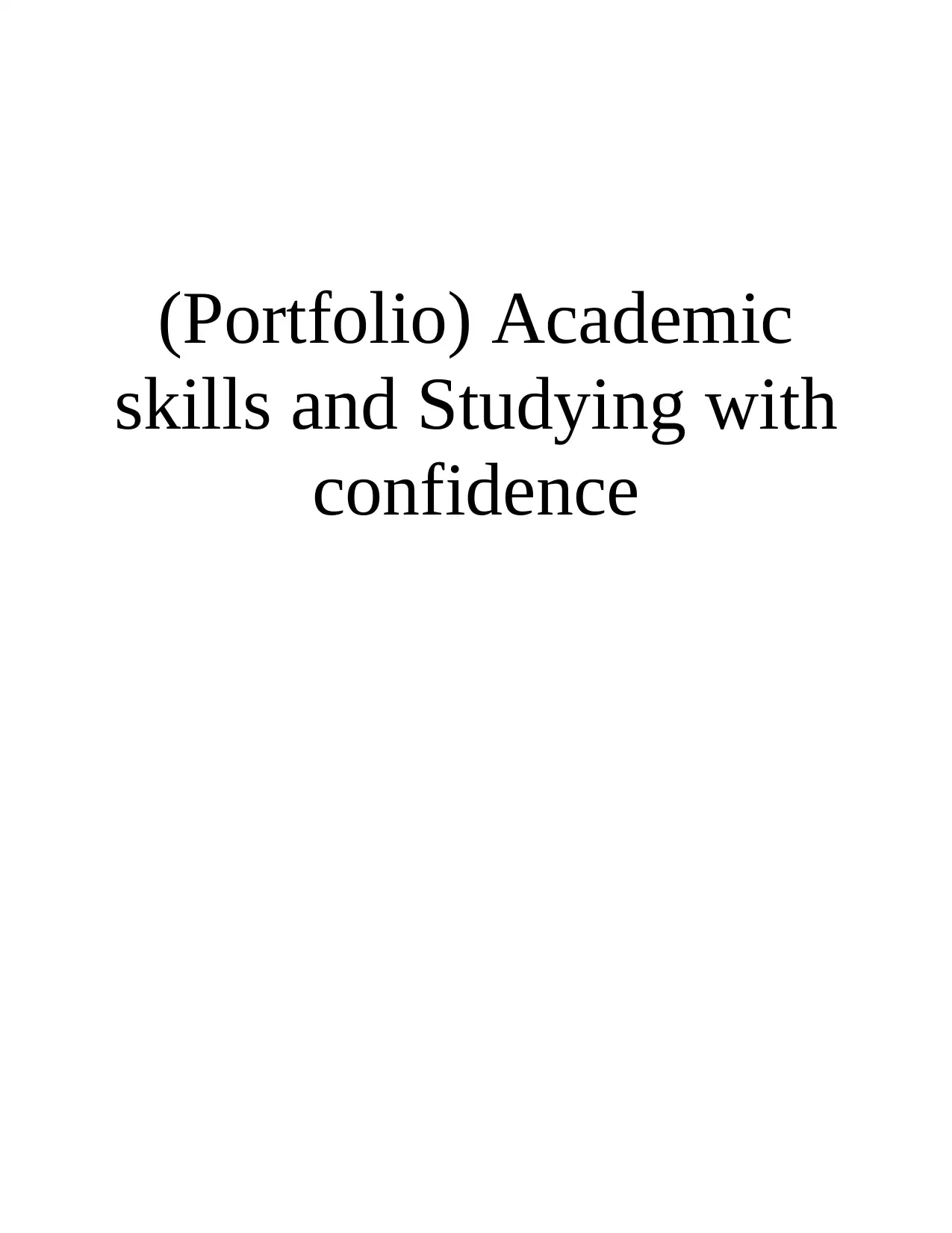
(Portfolio) Academic
skills and Studying with
confidence
skills and Studying with
confidence
Secure Best Marks with AI Grader
Need help grading? Try our AI Grader for instant feedback on your assignments.
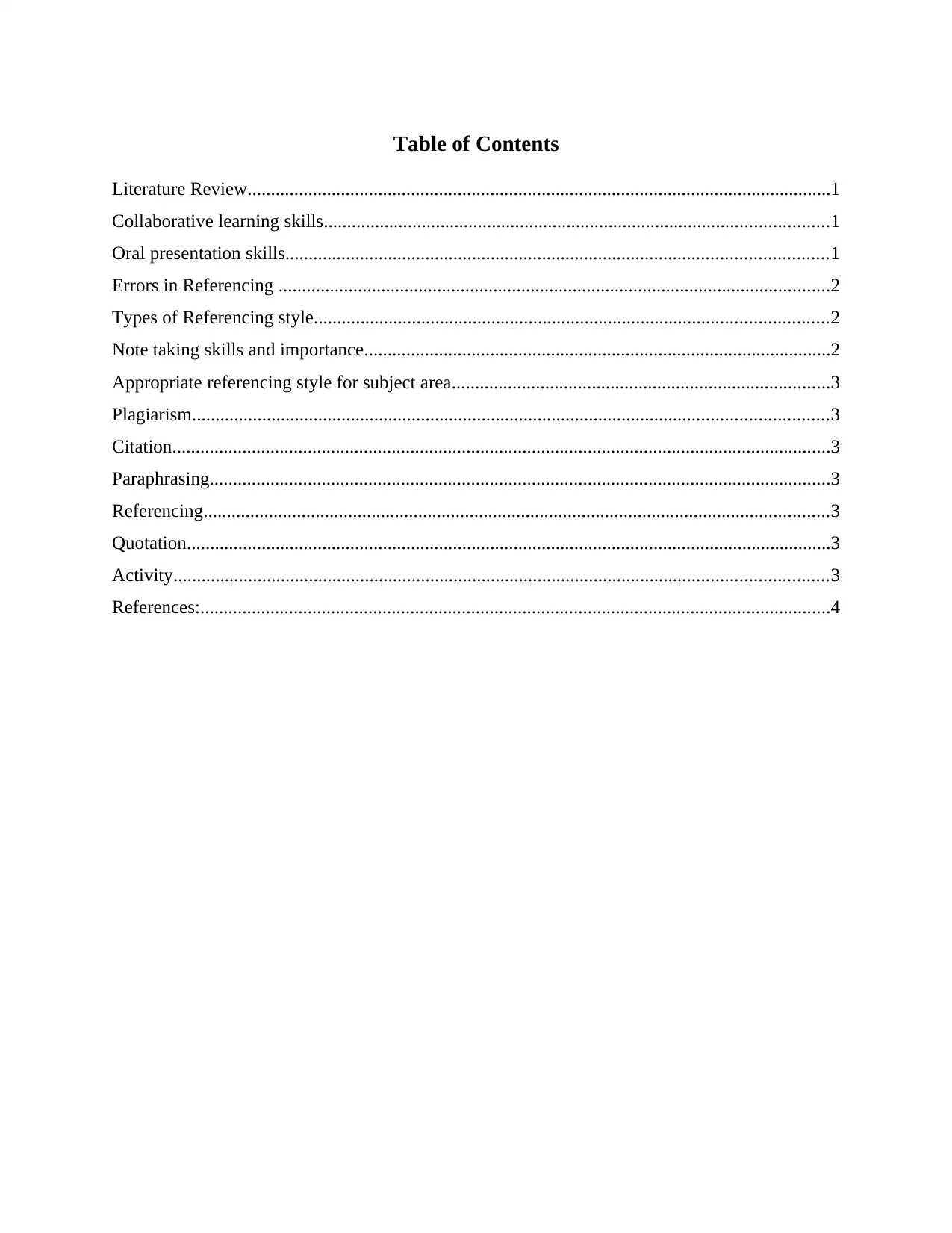
Table of Contents
Literature Review.............................................................................................................................1
Collaborative learning skills............................................................................................................1
Oral presentation skills....................................................................................................................1
Errors in Referencing ......................................................................................................................2
Types of Referencing style..............................................................................................................2
Note taking skills and importance....................................................................................................2
Appropriate referencing style for subject area.................................................................................3
Plagiarism........................................................................................................................................3
Citation.............................................................................................................................................3
Paraphrasing.....................................................................................................................................3
Referencing......................................................................................................................................3
Quotation..........................................................................................................................................3
Activity............................................................................................................................................3
References:.......................................................................................................................................4
Literature Review.............................................................................................................................1
Collaborative learning skills............................................................................................................1
Oral presentation skills....................................................................................................................1
Errors in Referencing ......................................................................................................................2
Types of Referencing style..............................................................................................................2
Note taking skills and importance....................................................................................................2
Appropriate referencing style for subject area.................................................................................3
Plagiarism........................................................................................................................................3
Citation.............................................................................................................................................3
Paraphrasing.....................................................................................................................................3
Referencing......................................................................................................................................3
Quotation..........................................................................................................................................3
Activity............................................................................................................................................3
References:.......................................................................................................................................4
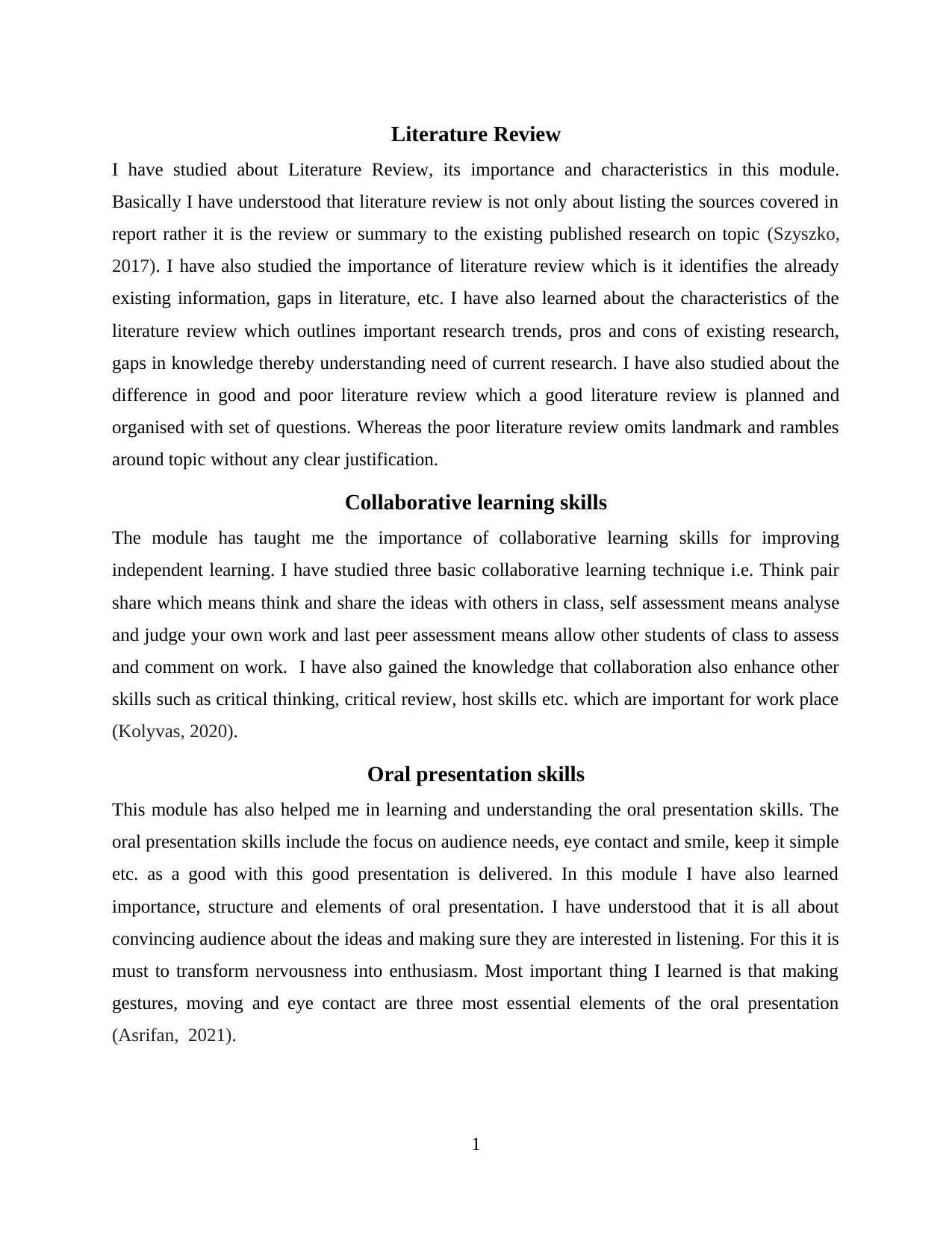
Literature Review
I have studied about Literature Review, its importance and characteristics in this module.
Basically I have understood that literature review is not only about listing the sources covered in
report rather it is the review or summary to the existing published research on topic (Szyszko,
2017). I have also studied the importance of literature review which is it identifies the already
existing information, gaps in literature, etc. I have also learned about the characteristics of the
literature review which outlines important research trends, pros and cons of existing research,
gaps in knowledge thereby understanding need of current research. I have also studied about the
difference in good and poor literature review which a good literature review is planned and
organised with set of questions. Whereas the poor literature review omits landmark and rambles
around topic without any clear justification.
Collaborative learning skills
The module has taught me the importance of collaborative learning skills for improving
independent learning. I have studied three basic collaborative learning technique i.e. Think pair
share which means think and share the ideas with others in class, self assessment means analyse
and judge your own work and last peer assessment means allow other students of class to assess
and comment on work. I have also gained the knowledge that collaboration also enhance other
skills such as critical thinking, critical review, host skills etc. which are important for work place
(Kolyvas, 2020).
Oral presentation skills
This module has also helped me in learning and understanding the oral presentation skills. The
oral presentation skills include the focus on audience needs, eye contact and smile, keep it simple
etc. as a good with this good presentation is delivered. In this module I have also learned
importance, structure and elements of oral presentation. I have understood that it is all about
convincing audience about the ideas and making sure they are interested in listening. For this it is
must to transform nervousness into enthusiasm. Most important thing I learned is that making
gestures, moving and eye contact are three most essential elements of the oral presentation
(Asrifan, 2021).
1
I have studied about Literature Review, its importance and characteristics in this module.
Basically I have understood that literature review is not only about listing the sources covered in
report rather it is the review or summary to the existing published research on topic (Szyszko,
2017). I have also studied the importance of literature review which is it identifies the already
existing information, gaps in literature, etc. I have also learned about the characteristics of the
literature review which outlines important research trends, pros and cons of existing research,
gaps in knowledge thereby understanding need of current research. I have also studied about the
difference in good and poor literature review which a good literature review is planned and
organised with set of questions. Whereas the poor literature review omits landmark and rambles
around topic without any clear justification.
Collaborative learning skills
The module has taught me the importance of collaborative learning skills for improving
independent learning. I have studied three basic collaborative learning technique i.e. Think pair
share which means think and share the ideas with others in class, self assessment means analyse
and judge your own work and last peer assessment means allow other students of class to assess
and comment on work. I have also gained the knowledge that collaboration also enhance other
skills such as critical thinking, critical review, host skills etc. which are important for work place
(Kolyvas, 2020).
Oral presentation skills
This module has also helped me in learning and understanding the oral presentation skills. The
oral presentation skills include the focus on audience needs, eye contact and smile, keep it simple
etc. as a good with this good presentation is delivered. In this module I have also learned
importance, structure and elements of oral presentation. I have understood that it is all about
convincing audience about the ideas and making sure they are interested in listening. For this it is
must to transform nervousness into enthusiasm. Most important thing I learned is that making
gestures, moving and eye contact are three most essential elements of the oral presentation
(Asrifan, 2021).
1
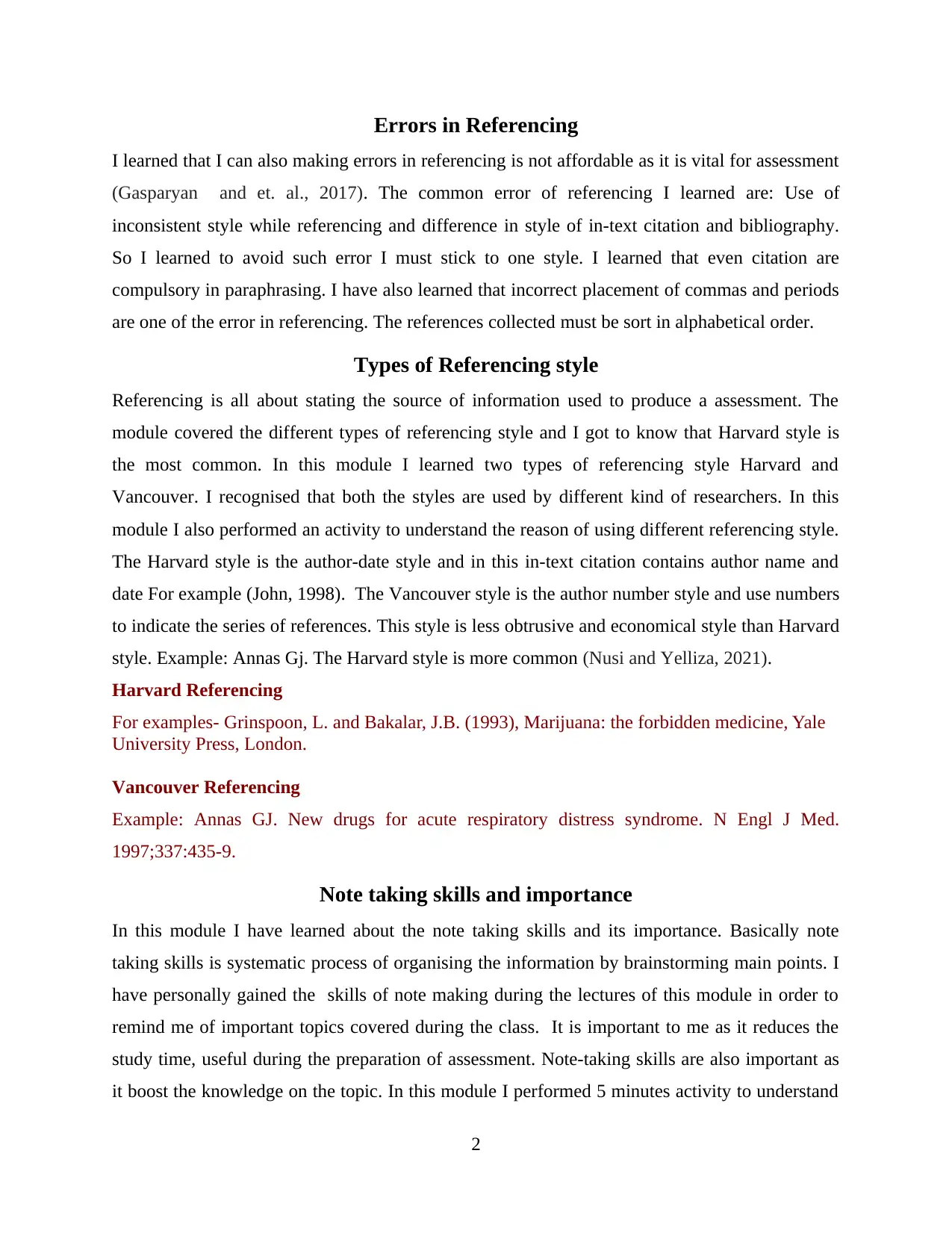
Errors in Referencing
I learned that I can also making errors in referencing is not affordable as it is vital for assessment
(Gasparyan and et. al., 2017). The common error of referencing I learned are: Use of
inconsistent style while referencing and difference in style of in-text citation and bibliography.
So I learned to avoid such error I must stick to one style. I learned that even citation are
compulsory in paraphrasing. I have also learned that incorrect placement of commas and periods
are one of the error in referencing. The references collected must be sort in alphabetical order.
Types of Referencing style
Referencing is all about stating the source of information used to produce a assessment. The
module covered the different types of referencing style and I got to know that Harvard style is
the most common. In this module I learned two types of referencing style Harvard and
Vancouver. I recognised that both the styles are used by different kind of researchers. In this
module I also performed an activity to understand the reason of using different referencing style.
The Harvard style is the author-date style and in this in-text citation contains author name and
date For example (John, 1998). The Vancouver style is the author number style and use numbers
to indicate the series of references. This style is less obtrusive and economical style than Harvard
style. Example: Annas Gj. The Harvard style is more common (Nusi and Yelliza, 2021).
Harvard Referencing
For examples- Grinspoon, L. and Bakalar, J.B. (1993), Marijuana: the forbidden medicine, Yale
University Press, London.
Vancouver Referencing
Example: Annas GJ. New drugs for acute respiratory distress syndrome. N Engl J Med.
1997;337:435-9.
Note taking skills and importance
In this module I have learned about the note taking skills and its importance. Basically note
taking skills is systematic process of organising the information by brainstorming main points. I
have personally gained the skills of note making during the lectures of this module in order to
remind me of important topics covered during the class. It is important to me as it reduces the
study time, useful during the preparation of assessment. Note-taking skills are also important as
it boost the knowledge on the topic. In this module I performed 5 minutes activity to understand
2
I learned that I can also making errors in referencing is not affordable as it is vital for assessment
(Gasparyan and et. al., 2017). The common error of referencing I learned are: Use of
inconsistent style while referencing and difference in style of in-text citation and bibliography.
So I learned to avoid such error I must stick to one style. I learned that even citation are
compulsory in paraphrasing. I have also learned that incorrect placement of commas and periods
are one of the error in referencing. The references collected must be sort in alphabetical order.
Types of Referencing style
Referencing is all about stating the source of information used to produce a assessment. The
module covered the different types of referencing style and I got to know that Harvard style is
the most common. In this module I learned two types of referencing style Harvard and
Vancouver. I recognised that both the styles are used by different kind of researchers. In this
module I also performed an activity to understand the reason of using different referencing style.
The Harvard style is the author-date style and in this in-text citation contains author name and
date For example (John, 1998). The Vancouver style is the author number style and use numbers
to indicate the series of references. This style is less obtrusive and economical style than Harvard
style. Example: Annas Gj. The Harvard style is more common (Nusi and Yelliza, 2021).
Harvard Referencing
For examples- Grinspoon, L. and Bakalar, J.B. (1993), Marijuana: the forbidden medicine, Yale
University Press, London.
Vancouver Referencing
Example: Annas GJ. New drugs for acute respiratory distress syndrome. N Engl J Med.
1997;337:435-9.
Note taking skills and importance
In this module I have learned about the note taking skills and its importance. Basically note
taking skills is systematic process of organising the information by brainstorming main points. I
have personally gained the skills of note making during the lectures of this module in order to
remind me of important topics covered during the class. It is important to me as it reduces the
study time, useful during the preparation of assessment. Note-taking skills are also important as
it boost the knowledge on the topic. In this module I performed 5 minutes activity to understand
2
Secure Best Marks with AI Grader
Need help grading? Try our AI Grader for instant feedback on your assignments.
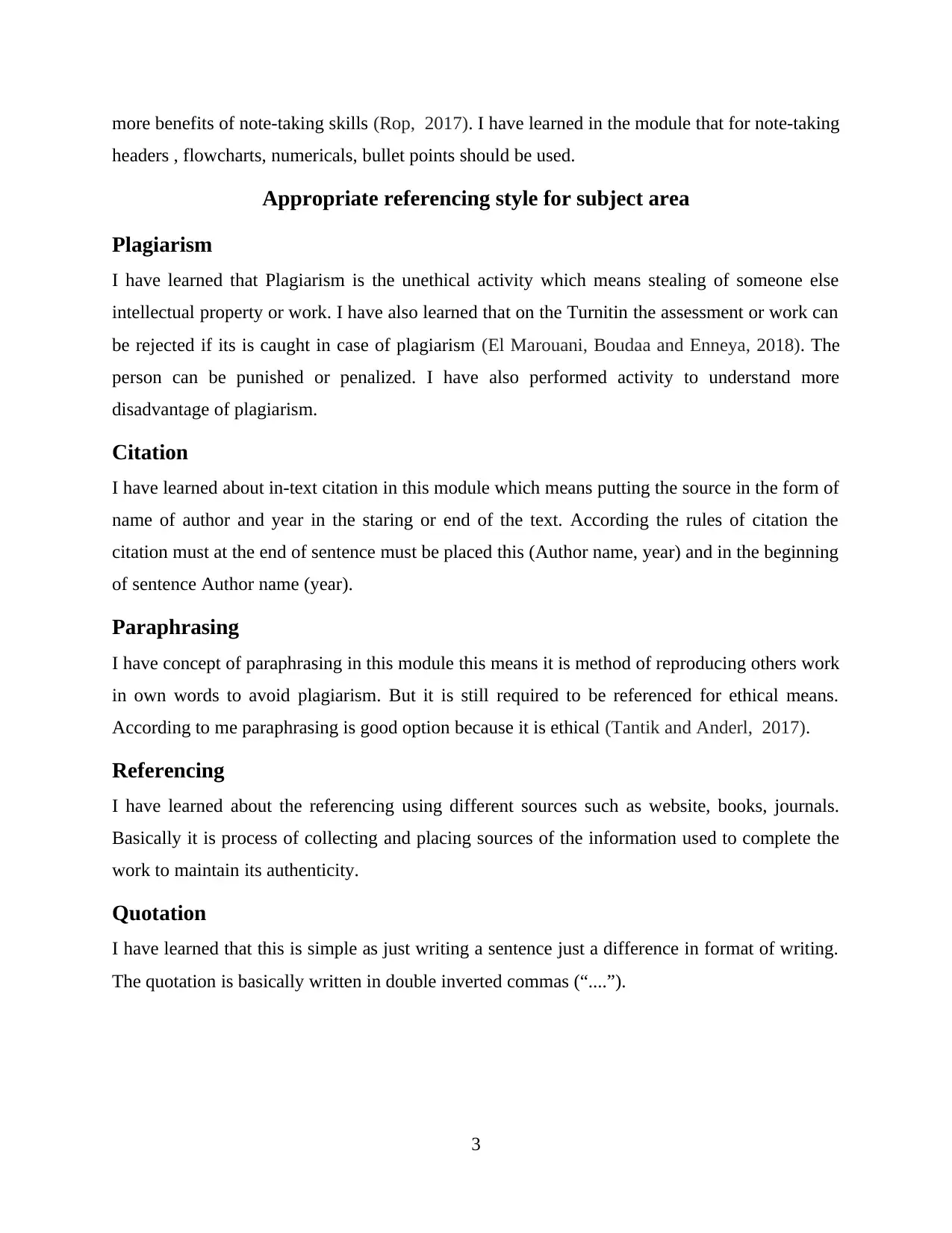
more benefits of note-taking skills (Rop, 2017). I have learned in the module that for note-taking
headers , flowcharts, numericals, bullet points should be used.
Appropriate referencing style for subject area
Plagiarism
I have learned that Plagiarism is the unethical activity which means stealing of someone else
intellectual property or work. I have also learned that on the Turnitin the assessment or work can
be rejected if its is caught in case of plagiarism (El Marouani, Boudaa and Enneya, 2018). The
person can be punished or penalized. I have also performed activity to understand more
disadvantage of plagiarism.
Citation
I have learned about in-text citation in this module which means putting the source in the form of
name of author and year in the staring or end of the text. According the rules of citation the
citation must at the end of sentence must be placed this (Author name, year) and in the beginning
of sentence Author name (year).
Paraphrasing
I have concept of paraphrasing in this module this means it is method of reproducing others work
in own words to avoid plagiarism. But it is still required to be referenced for ethical means.
According to me paraphrasing is good option because it is ethical (Tantik and Anderl, 2017).
Referencing
I have learned about the referencing using different sources such as website, books, journals.
Basically it is process of collecting and placing sources of the information used to complete the
work to maintain its authenticity.
Quotation
I have learned that this is simple as just writing a sentence just a difference in format of writing.
The quotation is basically written in double inverted commas (“....”).
3
headers , flowcharts, numericals, bullet points should be used.
Appropriate referencing style for subject area
Plagiarism
I have learned that Plagiarism is the unethical activity which means stealing of someone else
intellectual property or work. I have also learned that on the Turnitin the assessment or work can
be rejected if its is caught in case of plagiarism (El Marouani, Boudaa and Enneya, 2018). The
person can be punished or penalized. I have also performed activity to understand more
disadvantage of plagiarism.
Citation
I have learned about in-text citation in this module which means putting the source in the form of
name of author and year in the staring or end of the text. According the rules of citation the
citation must at the end of sentence must be placed this (Author name, year) and in the beginning
of sentence Author name (year).
Paraphrasing
I have concept of paraphrasing in this module this means it is method of reproducing others work
in own words to avoid plagiarism. But it is still required to be referenced for ethical means.
According to me paraphrasing is good option because it is ethical (Tantik and Anderl, 2017).
Referencing
I have learned about the referencing using different sources such as website, books, journals.
Basically it is process of collecting and placing sources of the information used to complete the
work to maintain its authenticity.
Quotation
I have learned that this is simple as just writing a sentence just a difference in format of writing.
The quotation is basically written in double inverted commas (“....”).
3
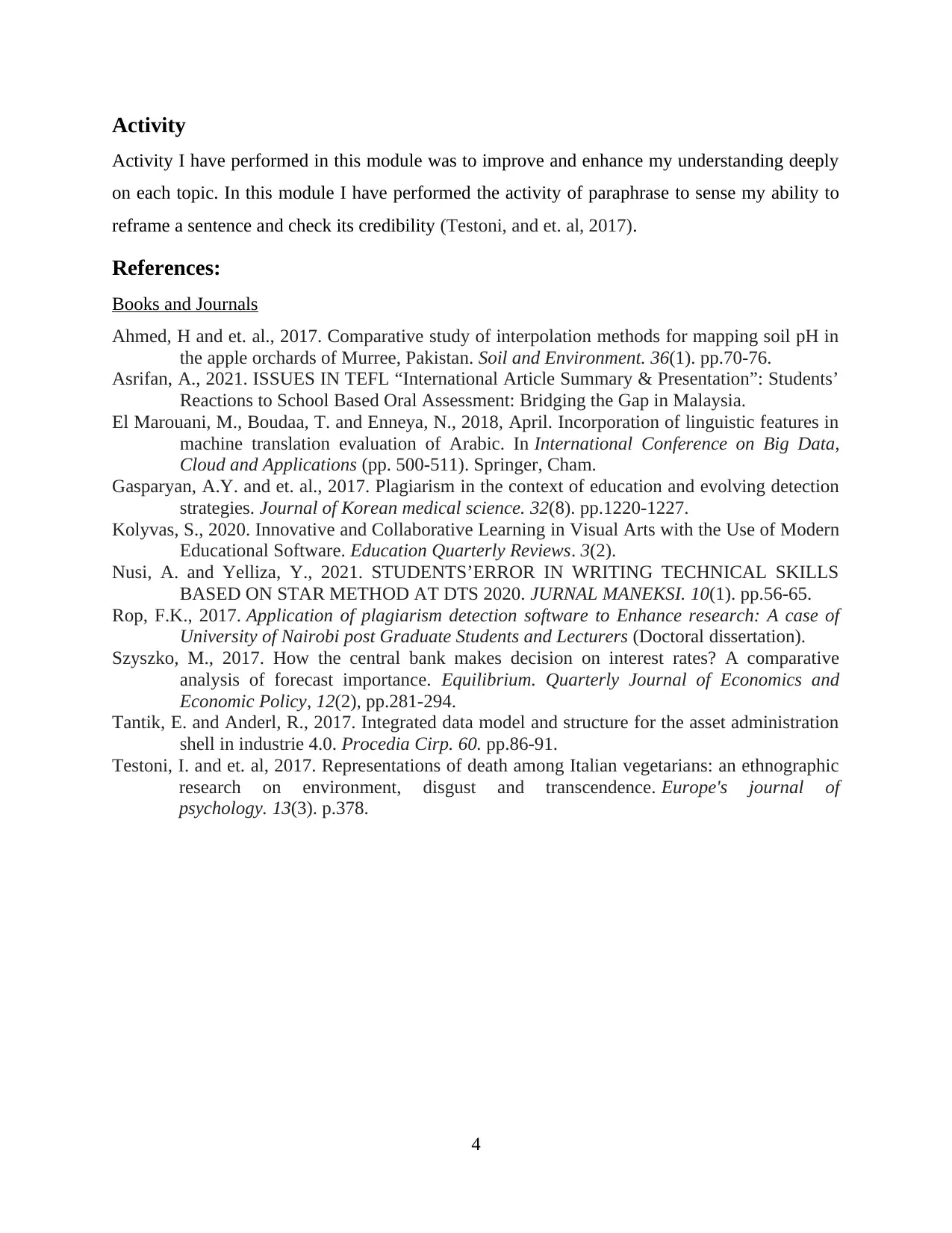
Activity
Activity I have performed in this module was to improve and enhance my understanding deeply
on each topic. In this module I have performed the activity of paraphrase to sense my ability to
reframe a sentence and check its credibility (Testoni, and et. al, 2017).
References:
Books and Journals
Ahmed, H and et. al., 2017. Comparative study of interpolation methods for mapping soil pH in
the apple orchards of Murree, Pakistan. Soil and Environment. 36(1). pp.70-76.
Asrifan, A., 2021. ISSUES IN TEFL “International Article Summary & Presentation”: Students’
Reactions to School Based Oral Assessment: Bridging the Gap in Malaysia.
El Marouani, M., Boudaa, T. and Enneya, N., 2018, April. Incorporation of linguistic features in
machine translation evaluation of Arabic. In International Conference on Big Data,
Cloud and Applications (pp. 500-511). Springer, Cham.
Gasparyan, A.Y. and et. al., 2017. Plagiarism in the context of education and evolving detection
strategies. Journal of Korean medical science. 32(8). pp.1220-1227.
Kolyvas, S., 2020. Innovative and Collaborative Learning in Visual Arts with the Use of Modern
Educational Software. Education Quarterly Reviews. 3(2).
Nusi, A. and Yelliza, Y., 2021. STUDENTS’ERROR IN WRITING TECHNICAL SKILLS
BASED ON STAR METHOD AT DTS 2020. JURNAL MANEKSI. 10(1). pp.56-65.
Rop, F.K., 2017. Application of plagiarism detection software to Enhance research: A case of
University of Nairobi post Graduate Students and Lecturers (Doctoral dissertation).
Szyszko, M., 2017. How the central bank makes decision on interest rates? A comparative
analysis of forecast importance. Equilibrium. Quarterly Journal of Economics and
Economic Policy, 12(2), pp.281-294.
Tantik, E. and Anderl, R., 2017. Integrated data model and structure for the asset administration
shell in industrie 4.0. Procedia Cirp. 60. pp.86-91.
Testoni, I. and et. al, 2017. Representations of death among Italian vegetarians: an ethnographic
research on environment, disgust and transcendence. Europe's journal of
psychology. 13(3). p.378.
4
Activity I have performed in this module was to improve and enhance my understanding deeply
on each topic. In this module I have performed the activity of paraphrase to sense my ability to
reframe a sentence and check its credibility (Testoni, and et. al, 2017).
References:
Books and Journals
Ahmed, H and et. al., 2017. Comparative study of interpolation methods for mapping soil pH in
the apple orchards of Murree, Pakistan. Soil and Environment. 36(1). pp.70-76.
Asrifan, A., 2021. ISSUES IN TEFL “International Article Summary & Presentation”: Students’
Reactions to School Based Oral Assessment: Bridging the Gap in Malaysia.
El Marouani, M., Boudaa, T. and Enneya, N., 2018, April. Incorporation of linguistic features in
machine translation evaluation of Arabic. In International Conference on Big Data,
Cloud and Applications (pp. 500-511). Springer, Cham.
Gasparyan, A.Y. and et. al., 2017. Plagiarism in the context of education and evolving detection
strategies. Journal of Korean medical science. 32(8). pp.1220-1227.
Kolyvas, S., 2020. Innovative and Collaborative Learning in Visual Arts with the Use of Modern
Educational Software. Education Quarterly Reviews. 3(2).
Nusi, A. and Yelliza, Y., 2021. STUDENTS’ERROR IN WRITING TECHNICAL SKILLS
BASED ON STAR METHOD AT DTS 2020. JURNAL MANEKSI. 10(1). pp.56-65.
Rop, F.K., 2017. Application of plagiarism detection software to Enhance research: A case of
University of Nairobi post Graduate Students and Lecturers (Doctoral dissertation).
Szyszko, M., 2017. How the central bank makes decision on interest rates? A comparative
analysis of forecast importance. Equilibrium. Quarterly Journal of Economics and
Economic Policy, 12(2), pp.281-294.
Tantik, E. and Anderl, R., 2017. Integrated data model and structure for the asset administration
shell in industrie 4.0. Procedia Cirp. 60. pp.86-91.
Testoni, I. and et. al, 2017. Representations of death among Italian vegetarians: an ethnographic
research on environment, disgust and transcendence. Europe's journal of
psychology. 13(3). p.378.
4
1 out of 6
Related Documents
Your All-in-One AI-Powered Toolkit for Academic Success.
+13062052269
info@desklib.com
Available 24*7 on WhatsApp / Email
![[object Object]](/_next/static/media/star-bottom.7253800d.svg)
Unlock your academic potential
© 2024 | Zucol Services PVT LTD | All rights reserved.




